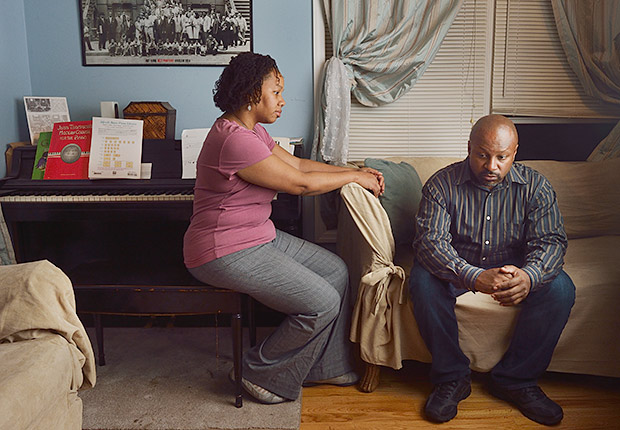AARP Eye Center

By Aliya S. King
When Wil Hylton’s mother became too infirm to live alone, he and his wife, Ghana, began searching for a new home—one with a ground-floor bedroom.
The Hyltons bought a house in Montclair in 2009, but they hadn’t considered another expense—the need for a home health aide to assist his mother while Hylton and his wife were at work.
“My mother’s insurance would only cover a caregiver for three hours a day,” said Hylton, now 49. “That wasn’t nearly enough. So even though I’d purchased a house specifically with my mom in mind, I had to start looking at nursing homes.”
After searching for the right facility and negotiating with his mother’s insurance company, Hylton was able to find an “immaculate” nursing home with a caring staff that was just a five-minute drive away.
“I would have preferred to have her at home with us,” Hylton said. “But I’m grateful that I was able to navigate the red tape to get her into the best facility possible. And that wasn’t easy.”
Hylton’s story is not unusual. Roughly 1.8 million unpaid family caregivers in New Jersey helped relatives during 2011, according to an AARP Public Policy Institute (PPI) report. That assistance had a value of $13.2 billion.
Hylton’s experience is also consistent with the findings of a report released in June by PPI along with the Commonwealth Fund and the SCAN Foundation.
Worries about bedsores
That report ranked New Jersey near the bottom of the states, at 36th, in the ease of moving people between long-term care facilities and their homes.
The state ranked in the bottom quartile for the high rate of nursing home patients being admitted to hospitals and the low rate of nursing home patients returning to the community.
Of particular concern, New Jersey had the second-highest rate of nursing home residents with bedsores. That was something Hylton was worried about when choosing a facility for his mother, who died in 2011.
Douglas Johnston, AARP New Jersey governmental affairs manager, is concerned about the state’s rankings.
“On an overall basis, New Jersey needs to do much better than this for our residents,” he said. “We are particularly concerned about the [rankings for] pressure sores—a very serious and life-threatening quality of care problem.”
New Jersey ranked 26th nationwide overall in caregiving services and support, a sobering fact as the number of residents 60 and older will grow from about 1.7 million in 2010 to 2.5 million by 2030.
Addressing the state’s mediocre rankings, Nicole Brossoie, New Jersey’s assistant commissioner of public affairs, said the study does not take into account what is happening now to the state’s homebound infirm and their caretakers.
“The report card uses a number of indicators with data from previous years and does not fully reflect what New Jersey has accomplished in the last several years,” Brossoie said.
She noted that New Jersey is now receiving a $108.5 million grant from the federal Centers for Medicare and Medicaid Services to increase access to noninstitutional long-term care services such as adult day care.
The award will help the state shift its spending from institutional care such as nursing homes to care at home and in the community.
Johnston said the next step in increasing support for hospital patients and their family caregivers should be implementation of the Caregiver Advise, Record, Enable (CARE) Act
The CARE Act’s main thrust is to assist unpaid caregivers by giving them better information about caring for loved ones at home after they are discharged from nursing homes and hospitals.
“There are no simple solutions” for helping caregivers, Johnston said. “But the CARE Act is a big step toward improving our overall ranking and supports for family caregivers.”
Aliya S. King is a writer living in Bloomfield, N.J.























































